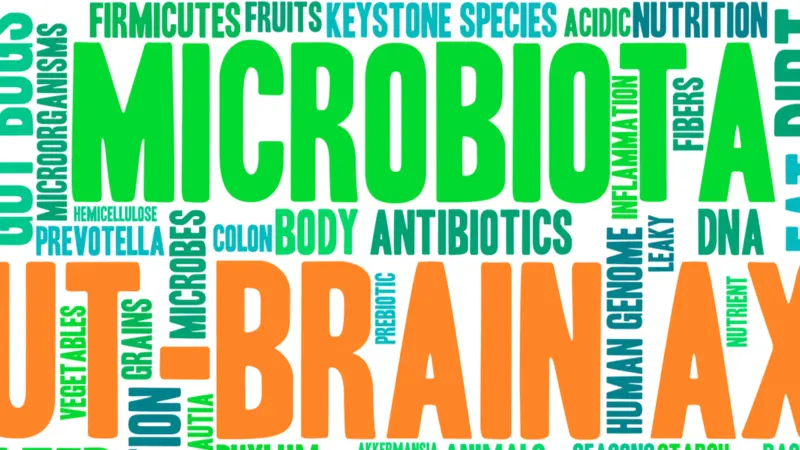

Mental and Behavioral Well-Being

Mental and Behavioral Well-Being
The Gut-Brain Connection and Its Role in Depression
The gut-brain axis is the communication system between the gut and the brain. Bidirectional communication occurs through multiple pathways that include hormonal, neural, and immune mediators. About 75% of the body’s neurotransmitters are produced in the gastrointestinal tract, directly connecting the gut to the brain. A growing body of evidence suggests that the health of the gut microbiome is closely linked to brain function and mental health. Researchers have hypothesized that gut bacteria may be used to treat clinical depression.
Not all gut bacteria are created equal. Some are beneficial and others are harmful to health. A healthy gut has a ratio of about 85% good bacteria and 15% harmful bacteria. If this ratio becomes imbalanced, the lining of the gastrointestinal tract may become porous, a condition known as “leaky gut.” Leaky gut has been linked to chronic inflammation and is associated with anxiety and depression, as well as ADD/ADHD, Parkinson’s disease, Alzheimer’s disease, autoimmune diseases, digestive issues, and allergies.
The field of neurogastroenterology studies the interactions between the brain and the gut, and research in this area has been rapidly evolving. One specific area of study is looking at the relationship between bacterial constituents and depression, in particular how variations in the gut bacteria may ultimately contribute to alterations of mood.
In 2017 researchers at UCLA were able to establish for the first time a correlation between differences in human gut microbial composition and the volume of brain regions involved in processing sensory information in patients with irritable bowel syndrome (IBS). The study also found a connection between childhood emotional trauma and IBS, suggesting “brain driven disturbances of the gut microbial environment in early life may have a long-lasting effect on gut microbial composition persisting throughout life, which in turn may lead to further changes in brain structure/function.”
One specific area of study is looking at the relationship between bacterial constituents and depression.
A 2018 study conducted by researchers from Northeastern University and Weill Cornell Medical College evaluated brain scans and fecal samples of people who had been diagnosed with depression. They found that subjects with brain patterns associated with depression also had fewer Bacteroides bacteria. These bacteria produce a brain-calming neurotransmitter called GABA. Lower levels of GABA have been linked to depression, anxiety, stress, and insomnia. A 2011 study using mice found that ingesting bacteria that increased GABA levels resulted in a decrease in behaviors associated with depression and anxiety. These findings may open the door for new studies to investigate whether bacteria that promote GABA production may be used to treat depression.
A recent Belgian study published in the journal Nature Microbiology compared the gut microbiome from more than one thousand participants with measurements of quality of life indicators including depression. Researchers found a higher prevalence of depression among subjects with lower levels of Bacteriodes enterotype 2. Higher quality of life indicators were found in subjects with higher levels of Faecalibacterium and Coprococcus—organisms that are known to be associated with reduced inflammation. In addition, the researchers noted a correlation between mood-regulating pathways and the neurotransmitters dopamine and GABA.
Dr. David Perlmutter, MD, a neurologist and adjunct instructor at the Institute for Functional Medicine (IFM), notes that depression is fundamentally an inflammatory disorder and these findings are helping scientists understand the relationship between lower levels of bacteria that reduce inflammation and depression. Dr. Elizabeth Boham, MD and IFM educator, also makes the connection between inflammation and the digestive system, emphasizing, “All of the systems of the body are intertwined.” She points out that inflammation in other areas of the body often can be traced back to the digestive system.
Dr. Perlmutter suggests that food choices can be an important tool in modulating the gut bacteria to promote mental and physical health.
Foods and supplements containing probiotics have been shown in clinical studies to correlate with regulation of the body’s response to stress as well as depressive and anxiety symptoms. A 2015 study showed that fermented foods rich in probiotics may have a protective effect against social anxiety for those at higher genetic risk for anxiety. A 2017 systematic review of probiotics and depressive symptoms in humans concluded that there is compelling evidence that probiotics alleviate depressive symptoms. A meta-analysis in 2017 found that probiotic consumption may improve symptoms of depression, anxiety, and perceived stress in healthy human study participants. A 2018 randomized clinical trial on patients with major depressive disorder showed an improvement in symptoms after eight weeks of probiotic supplements.
Researchers caution that, to date, studies of probiotics to treat depression have not had large enough sample sizes to clearly determine their effectiveness. In fact, some studies have failed to show any benefit of probiotic supplementation on mood or inflammation. However, as neurogastroenterology research continues to evolve, a better understanding of the microbiome may revolutionize new therapies for mood disorders such as depression.
Dr. Perlmutter emphasizes that we need further research to draw conclusions regarding the role of specific bacteria in regulating mood, but he suggests that food choices can be an important tool in modulating the gut bacteria to promote mental and physical health.
Until specific bacteria therapies are developed, the Amen Clinics, an outpatient healthcare clinic focused on treating the whole person, offers three dietary recommendations to promote better gut health. They advise limiting alcohol consumption, because alcohol may kill good gut bacteria; avoid sugar, because it promotes the growth of yeast, a type of bad gut bacteria; and finally, try to consume prebiotics, which are a type of dietary fiber that promotes good gut bacteria. Prebiotics are found in apples, beans, cabbage, psyllium, artichokes, onions, leeks, asparagus, and root vegetables like sweet potatoes, yams, squash, jicama, beets, carrots, and turnips.
REFERENCES
Amen Clinics. (2019, October 25). Can gut bacteria treat depression? https://www.amenclinics.com/blog/can-gut-bacteria-treat-depression/
David Perlmutter, MD. (2019, August 6). Gut bacteria and their role in depression. https://www.drperlmutter.com/gut-bacteria-their-role-in-depression/
The Institute for Functional Medicine. (n.d.) The gut-brain axis & systems biology. https://www.ifm.org/news-insights/gut-brain-axis-systems-biology/


 By
By







